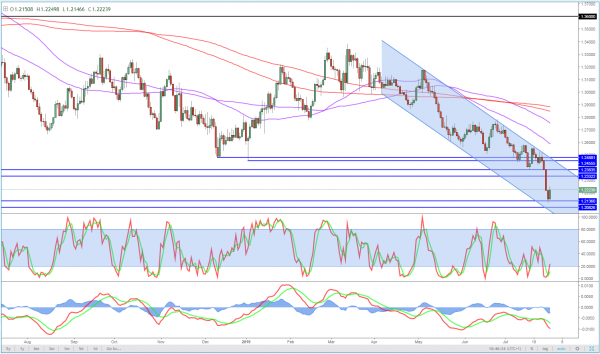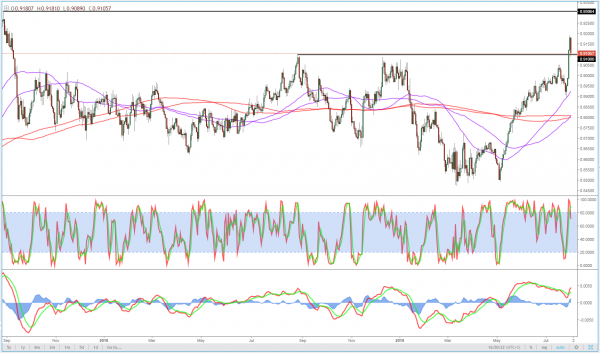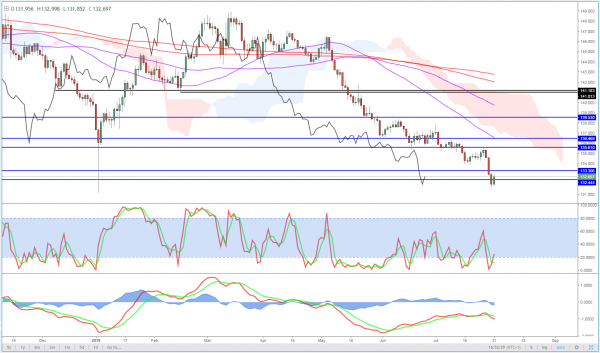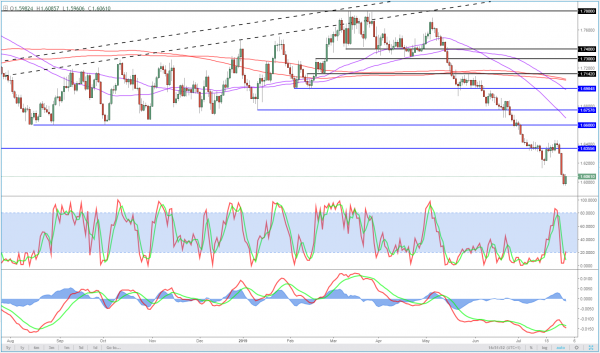Is there anything to be learned from BoE on Thursday?
The Bank of England’s “not-so-Super Thursday” has gone completely under the radar this week, having been completely overshadowed by other seemingly far more important events but traders will still be watching with interest.
Let’s face it, it’s understandable that the BoE is more of a supporting act this week. For one, the first Fed rate cut in a decade, fresh trade talks between the US and China and earnings season are more important at the moment and will often be viewed as such. On top of that, we’re in Brexit limbo right now so drawing a concrete conclusion from the BoE is as challenging as its ever been.
That said, traders have been busy increasingly pricing in no-deal Brexit since it became clear that Theresa May’s resignation was imminent and that has been ramped up in recent days by a no-deal PR offensive by Prime Minister Boris Johnson’s team. But will that have any impact on the BoE on Thursday?
- Brexit uncertainty makes BoE job impossible
- Economy not crying out for rate cuts, yet
- How will GBP respond on Thursday?
The BoE is no clearer on how the next few months is going to go than the rest of us. We all like to guess and try to anticipate what the next steps will be and explain the rationale behind certain actions but the reality is, very few people know the true rationale, how much of it is a bluff, how far they’re willing to go and what plan B is. And no one knows what the outcome of all this will be.
Being a central bank that must not only publish economic forecasts based on best-guess assumptions but also guide on interest rates on the back of them can’t be an easy job then. What’s more, you may expect the central bank to be given a little slack during such an uncertain time but it seems they’re held to account for their forecasts as much as they’ve ever been, and by certain factions intent on undermining them, far more so.
Those in the markets seem more focused on the political side of Brexit when determining the outlook for interest rates, rather than putting too much weight on what the central bank is saying. If you’re not convinced by that, look at the moves in sterling over the last couple of months and interest rate probabilities, this has not been driven by what Governor Carney or any of his colleagues have said.
To make matters more confusing, the economy is in a strong position with unemployment at a 44-year low, inflation on target and wages rising at a decent page. Growth is below-par and businesses aren’t particularly happy with the political limbo we are still in but all things considered, there’s no real pressure on the BoE to hit the panic button, as long as no-deal is avoided. If not, it will very much be a break glass moment on Threadneedle Street.
What can we expect from the pound on Thursday?
Safe to say, it’s been a bad time for the pound recently. The currency is not a fan of the uncertainty and economic turbulence that no-deal brings so is not coping well with the constant threats being publicly delivered by Johnson and his team. How much more damage could the BoE cause?
It’s really hard to say. The BoE has until now provided economic forecasts based on the assumption of a smooth Brexit. Just because the new administration has adopted a more aggressive approach, it doesn’t mean the BoE will change its base case assumption. If they did, then it could get very interesting.
Naturally, Carney and his colleagues will be questioned on their views of Johnson’s Brexit plans and what their response would be but I expect them to not be drawn into hypothetical, especially after how that went last time in early 2016. Who knows, Carney doesn’t have long left at the BoE, maybe he’ll have a little fun with the Brexiteers one last time.
GBPUSD Daily Chart
EURGBP Daily Chart
GBPJPY Daily Chart
GBPCAD Daily Chart




